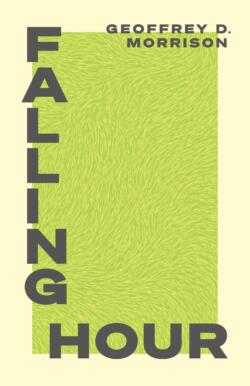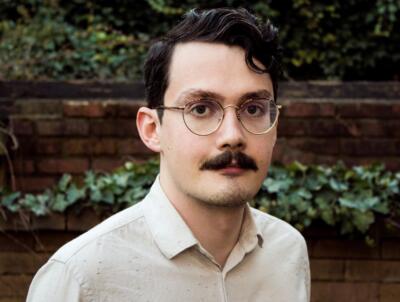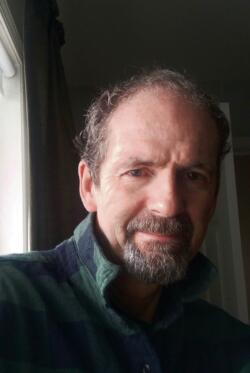1577 Alone in a park
Falling Hour
by Geoffrey D. Morrison
Toronto: Coach House Books, forthcoming February 2023
$22.95 / 9781552454466. To pre-order, click here
Reviewed by Danial Neil
*
 From the very beginning of this novel, there is a sense of something significant at work, an epic, perhaps, or something quite different, but equally triumphant. The table is set quickly as Geoffrey Morrison introduces us to Hugh Delgarno, a young man alone in a park. He thinks his brain is broken. It is information, a doorway that invites us into how he sees and understands his world, how he interprets events that begin with a certain banality. He had found a picture frame and wishes to sell it, and waits in the park for the potential purchaser.
From the very beginning of this novel, there is a sense of something significant at work, an epic, perhaps, or something quite different, but equally triumphant. The table is set quickly as Geoffrey Morrison introduces us to Hugh Delgarno, a young man alone in a park. He thinks his brain is broken. It is information, a doorway that invites us into how he sees and understands his world, how he interprets events that begin with a certain banality. He had found a picture frame and wishes to sell it, and waits in the park for the potential purchaser.
The frame was old I realized. And heavy. Heavier than the mass-produced ones I was used to, the kind my guardians would have bought to frame picture postcards of Capri sent to them by a better-off second cousin in Dundee, a woman they often told me was ‘up hersel’ whose picture-post cards they dutifully framed, cheaply. (As working-class Scottish people who had lived as children through the war years and rationing, they did everything as cheaply as possible. The Germans, they often told me, had blown up the skating rink.)
The narrative is ambitious, reaching back into historical events and their relational mark on Delgarno’s life. He was brought to Canada as small child by his great aunt and uncle. His Scottish roots haunt him, even limit him. He has an unobstructed hunger to understand, and at times vent, for the plight of the poor and oppressed, the underprivileged. He harangues the hypocrisy of Calvinists and Methodists, dips into political history of empires and their self-serving and religious roots. At times it rings like Truth and seems to escape the confines of a book and is released like doves into the corporeal world, and other times it seethes with outrage and longs for social justice. Morrison’s metaphors are rich and original, like Annie Proulx’s The Shipping News, and long sentence structure used in the spirit of Joseph Conrad. And the transitions from Delgarno’s observations in the park to the philosophical and associative narrative along the threads of his broken brain are remarkable. Morrison handles these originalities deftly with patience and pace, a compelling rhythm that reads like a poetic fusion of Delgarno’s Scottish ancestry along with the letters of Keats and visits from Dickinson, Woolf, Burns, and even George Carlin, and Marc Bolan of T. Rex fame. This is all done with seamless precision.

As Hugh Delgarno moves around the park, we are shown that there are no people, no cars in the street. He is alone, perhaps alone in the world. But he hears a bird, and remembers hearing it when he was younger on a perfectly ordinary day. Here, the recurring ascent into his broken mind begins with its entanglements of beauty and truth – the visual poetry of a red-winged blackbird. I particularly liked his march to the willow trees. He was walking slowly, much too slowly, and chastised himself.
God, was I slow. As slow as a snail. Ha ha. For thinking something so stupid I should have gone to jail. But I don’t really mean that. I hate all jails and guards, hate them as I do armies and missiles, as I do money and companies.
The narrative shifts with this cue, to the movie The Conversation with Gene Hackman, the character Harry Caul. Here we get a glimpse of the paranoid mind, of being watched by CIA Jims. Delgarno feels the urgency to be unwatched and makes it to the willow trees. The digressions are meaningful, entertaining chains linked to a thought. They are insightful, and move the story. This device is impressive with rich historical references, fitting and creative metaphor, and always with the heft of language and honesty.
It is nighttime in the park. Hugh carries the picture frame. He watches the city lights, the amber light of Victorian houses, the stars. He waits for the moon to rise. The rising of the moon.
For the song, ‘The Rising Moon,’ the song calling on the men from the mud-walled cabins to gather by the old bend in the river with their pikes, was a song of the United Irishmen and their revolt. Pikes against muskets, a uniformless army of the people against the red-jackets of the British Army. A defeat and a bloodbath, the leaders in exile or dead, the flight of the wild geese to France, to America, the unlucky ones to Australia’s prisons.
This is the entryway to a fascinating and educating account of Scotsman, Thomas Muir, exiled for his politics to Botany Bay. History buffs will remember Muir’s escape and arrival in the Pacific Northwest aboard the Otter.

This collection of thoughtful and cerebral digressions offers a particularly harsh view of colonialism and imperialism and the human cost to Indigenous people. Of, course this has been well documented in recent times. But Morrison presents a compelling narrative that can simply be received as information that accompanies the story-line, or a refreshing and enlightening perspective. I was moved by Hugh Delgarno’s meanderings, his laments, his incessant introspection. I had to return to several passages and rest with Morrison’s lengthy and stirring impressions, the sheer scope of them.
Falling Hour is an existential feast, a satisfying banquet of innovative fiction, ripe with free-flowing associations that astound, all with the cohesion of a lucid dream. It is not a lineal story in a conventional sense that travels down a road of place and time with its host of characters with their conflicts and arcs. Here, time feels suspended. We navigate the confines of a park. Nothing changes but the light, or a breeze. The subtleties of a day, the nuances of sound, the tactile impressions of damp grass, the black onyx of pond water, and the constancy of the picture frame, all anchor the story. This book is outside my lane. As a writer of literary fiction, such meanderings of my prose would be met with unbearable edits. Oh, to just let the mind have its way. There is a certain vulnerability to witness such a departure. But to have experienced Geoffrey Morrison’s brilliant debut novel, his reach for words, symbolic and relative, his bold and intelligent language and the stretch of its form, is inspiring. And perhaps that is what story-making is all about. We want to inspire, and be inspired. We want to reach for something more.
*

Danial Neil was born in New Westminster in 1954 and grew up in North Delta. He began writing in his teens, journaling and writing poetry. He made a decision to be a writer in 1986 and took his first creative writing course in Langley with Rhody Lake. Danial worked steadily at his craft, completing eight unpublished novels. And then one of his short stories was published in the 2003 Federation of BC Writers (FBCW) anthology edited by Susan Musgrave. He went on to participate in the FBCW’s Write Stretch Program, teaching free verse poetry to children. He won the poetry prize at the Surrey International Writers’ Conference four times and studied Creative Writing at UBC. His poetry and fiction articulate a close relationship with the land, its felt presence in his narrative and vision. He is the author of The Killing Jars (Trafford, 2006), Flight of the Dragonfly (Borealis/Tecumseh, 2009), The Trees of Calan Gray (Oolichan, 2015), my June (Ronsdale, 2014), Dominion of Mercy (NeWest Press, 2021), The Sum of One Man’s Pleasure (NeWest Press, forthcoming 2024), and contributor to the poetry anthology Worth More Standing (Caitlin Press, 2022). Danial lives on Vancouver Island. Editor’s note: Dan Neil has also reviewed books by Jaspreet Singh and Brian Thomas Isaac for The British Columbia Review, and his book Dominion of Mercy is reviewed by Zoe McKenna.
*
The British Columbia Review
Publisher and Editor: Richard Mackie
Formerly The Ormsby Review, The British Columbia Review is an on-line journal service for BC writers and readers. The Advisory Board consists of Jean Barman, Wade Davis, Robin Fisher, Cole Harris, Hugh Johnston, Kathy Mezei, Patricia Roy, Maria Tippett, and Graeme Wynn. Provincial Government Patron (since September 2018): Creative BC. Honorary Patron: Yosef Wosk. Scholarly Patron: SFU Graduate Liberal Studies.
“Only connect.” – E.M. Forster